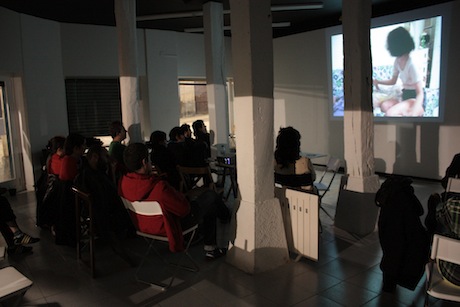Illegal_cinema
Forty-fourth session, Cine_ilegal
by
Film screening proposed by Pablo Marte, followed by a debate.
Le film à venir (Raoul Ruiz, 1997, 08:47)
Toute Révolution est un Coup de Dés (Straub & Huillet, 1977, 10:48)
Zig Zag. Le jeu de l’oie (Raoul Ruiz, 1980, 31:01)
Border (break – 5 min.)
Für Elise (Christoph Schlingensief, 1982, 01:43)
Terror 2000 – Intensivstation Deutschland (Christoph Schlingensief, 1994, 72:34)
maman e. s’en va au ciel / mutter e. fahrt zum himmel / el viaje a la felicidad de mamá e.
It’s easy to forget how easy it is to forget; perhaps because the smallest things can make an empty vessel feel fuller. As soon as you start living, your life, our lives, fill up – or so, interestingly, we tend to feel. However small the things that nestle inside us, we will always imagine them to be huge. Hugely important. Terribly necessary. This makes it complex work to map out any kind of inner/outer territory; work which first of all requires not that you start drawing border lines, but that you solve the equation that balances out the different imports in the world in their multiple forms and appearances/disappearances. Would this be a measure that would take in all other measures? This would appear to have been what was aspired to in a not-so-distant past (or, perhaps, a not-so-distant future, if everything always returns): to take it all in, to sweep everything into your own domain, smiling with your plastic-bristle teeth). This type of politics of surveyance was practiced on both sides of the ideological spectrum after the fireworks of ’68. A dystopian relationship between surveyance and the body. This is why the newer forms of art have coupled themselves so easily to the newer forms of urbanism: it’s all about cementing the social psyche of a country that was too good to be true. Brutalität oder Barbarei, we heard. And on such premises, the Kafkaesque thing known as the “u.e.” (to be spoken as if with wicked intent, sighing briefly after each word) was built.
Pablo Marte is an artist.
